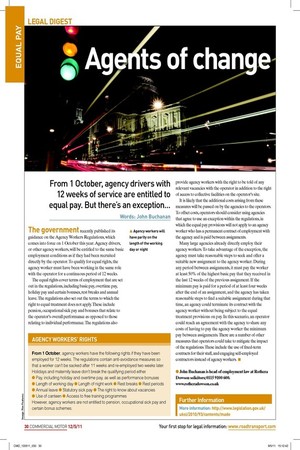Agents of change
Page 24

If you've noticed an error in this article please click here to report it so we can fix it.
From 1 October, agency drivers with 12 weeks of service are entitled to equal pay. But there’s an exception...
Words: John Buchanan The government recently published its guidance on the Agency Workers Regulations, which comes into force on 1 October this year. Agency drivers, or other agency workers, will be entitled to the same basic employment conditions as if they had been recruited directly by the operator. To qualify for equal rights, the agency worker must have been working in the same role with the operator for a continuous period of 12 weeks.
The equal rights cover terms of employment that are set out in the regulations, including basic pay, overtime pay, holiday pay and certain bonuses, rest breaks and annual leave. The regulations also set out the terms to which the right to equal treatment does not apply. These include pension, occupational sick pay and bonuses that relate to the operator’s overall performance as opposed to those relating to individual performance. The regulations also provide agency workers with the right to be told of any relevant vacancies with the operator in addition to the right of access to collective facilities on the operator’s site.
It is likely that the additional costs arising from these measures will be passed on by the agencies to the operators. To offset costs, operators should consider using agencies that agree to use an exception within the regulations, in which the equal pay provisions will not apply to an agency worker who has a permanent contract of employment with the agency and is paid between assignments.
Many large agencies already directly employ their agency workers. To take advantage of the exception, the agency must take reasonable steps to seek and offer a suitable new assignment to the agency worker. During any period between assignments, it must pay the worker at least 50% of the highest basic pay that they received in the last 12 weeks of the previous assignment. If the minimum pay is paid for a period of at least four weeks after the end of an assignment, and the agency has taken reasonable steps to ind a suitable assignment during that time, an agency could terminate its contract with the agency worker without being subject to the equal treatment provisions on pay. In this scenario, an operator could reach an agreement with the agency to share any costs of having to pay the agency worker the minimum pay between assignments. There are a number of other measures that operators could take to mitigate the impact of the regulations. These include the use of ixed-term contracts for their staff, and engaging self-employed contractors instead of agency workers. ■
● John Buchanan is head of employment law at Rothera Dowson solicitors; 0115 9100 600. www.rotheradowson.co.uk
Further Information
More information: http://www.legislation.gov.uk/ uksi/2010/93/contents/made












































